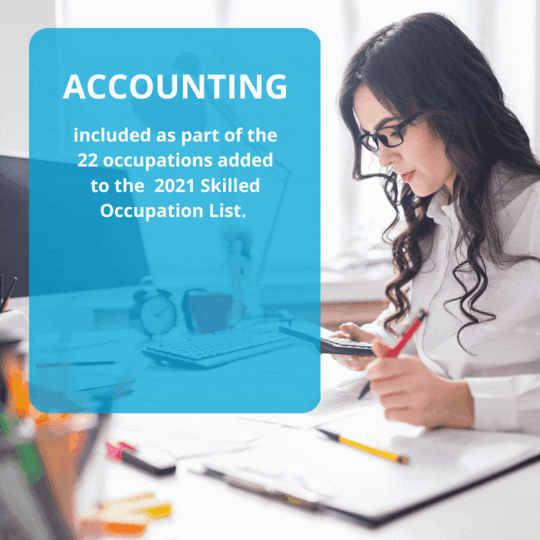> Finance management
> Business analysis
> strategy & development
> business management
> Investment advisory
> Risk management
> Entrepreneurship
Last updated: 31 October 2023
There are far more reasons to study accounting than you may realise and its influence in business goes far beyond ledgers, Excel sheets and invoices.
Accounting is in demand like never before, playing a critical frontline role in managing the economic impact post COVID-19, and helping clients to adapt business models in uncertain and changing circumstances.
With the evolution of different finance/accounting functions and technology, professionals are now realising the diversity a foundation in accounting offers, leading to either a traditional numbers-focused role or a more dynamic and business-focused career.
So, here are six top reasons to study accounting and pursue this field:
Australia will need an additional 30,000 accounting, audit, and finance professionals over the next three years to meet demand.
Current and future accounting students will be able to fill critical accounting skills in Australia, a strong demand in this industry will grow over the coming years.
The accounting-related occupations in national shortage and with strong future demand include:

Whether you are an Australian or an overseas student studying at an Australian institution, the accounting field offers great long-term potential for employment.
According to the Australian Government’s Labour Market Insights, the industry has strong growth (9.2%) over the next 5 years: The average accountant salary in Australia is currently $94,969 ($48.70 an hour) with most experienced employees making up to $118,848 a year. Around 80% of people in accounting work full-time which is above the national average of 66%.
'Accounting is the language of business'
– Warren Buffett, business magnate and investor
Just like mastering a language, having a solid foundation in accounting allows a professional to access a diverse range of roles in various businesses.
As a student of accounting, you don’t necessarily need to end up working as a ‘traditional’ accountant, recording transactions in ledgers and preparing profit and loss statements.
With developments in AI technology, the time spent on calculations and transactional tasks can be greatly reduced. Accountants can choose to specialise in the strategic side of finance such as forecasting and analysis. At that level, an accounting role can encompass the process of translating numbers into insights that can make a real impact on a business’s decision making.
In fact, studying accounting opens the doors to a whole range of interconnected careers, including:

> Finance management
> Business analysis
> strategy & development
> business management
> Investment advisory
> Risk management
> Entrepreneurship
The accounting industry has shown real resilience amidst the turbulence brought on by the COVID-19 pandemic. Demand from clients needing assistance during the pandemic boosted revenue across the nation’s largest accounting firms
Across the Top 100 in The Australian Financial Review Top 100 Accounting Firms list for 2021, revenue rose 4.3 per cent to $12.3 billion in the 2021 financial year. Furthermore, 92 of the Top 100 firms recorded an increase in annual revenue.
Due to JobKeeper and tax reforms introduced in the federal budget, there has been a strong growth in compliance-driven accounting activity to ensure business continuity for clients.
According to Bentleys Network CEO Tony Sacre, growth in the accounting sector looks optimistic as it moves from being "seen as a 'rear window' industry, [to] a forward-looking one that can assist people with forward planning, ensuring all their financial affairs are in order and illustrate a pathway to success".
Overseas students wishing to pursue accounting will find that Australian educational institutions are second to none in the world. For students considering their migration options, we recommend you talk with a migration agent.
Equipped with an Australian accounting degree, international students can also confidently return to their home countries with a competitive advantage over their peers and continue to advance in their accounting careers.
At KBS, our Master of Accounting and Master of Professional Accounting courses, as well as the Bachelor of Business (Accounting)* have industry accreditation from the following accounting bodies:
Upon successful completion, you are eligible for admission into professional programs offered by CPA Australia, CA ANZ and ACCA.
With qualifications like ACCA, you can work in more than 120 countries, allowing you to access a global career.

As an accountant, you have a great foundation for becoming an entrepreneur because you possess a mix of technical and strategic skills and have insight into how various industries and markets work.
Fundamental knowledge of how a business's finances should be structured and maintained is crucial to keeping a business operating efficiently and helping it expand.
There are many great examples of accountants-turned-entrepreneurs. One example is Michael Gietzen, who trained as an accountant and goes on to transform a family business into one of the United Kingdom’s top 100 fastest growing companies.
If you are a highly qualified and professional accountant with the right skills and qualifications, you might choose to start your own accounting firm one day, become an independent business consultant or offer bookkeeping services on a freelance basis.